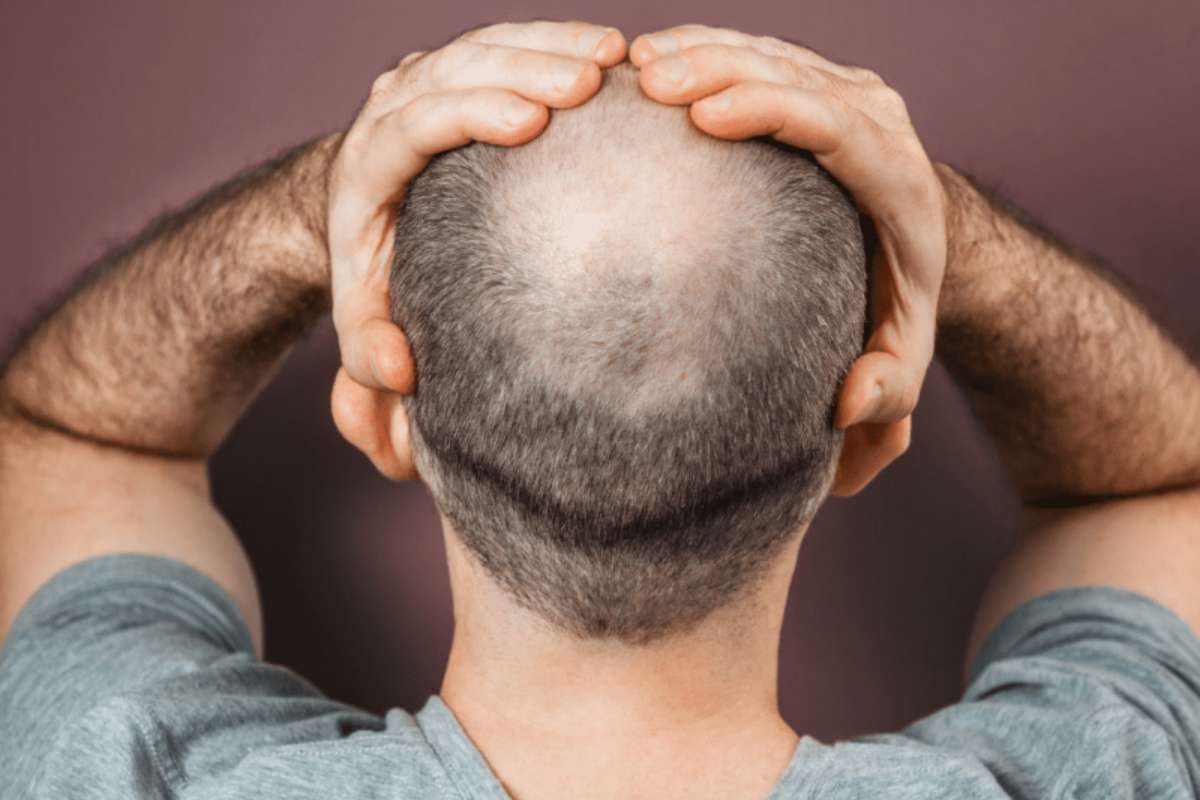Do you find yourself constantly brushing flakes off your shoulders? Have you tried anti-dandruff shampoo hoping that will correct the embarrassing problem?
If you are experiencing a flaky scalp, then there is a chance that it could be causing your hair to thin out.
Flaky/dry scalp is most often caused by run of the mill “dandruff”. The skin on your scalp is constantly replacing itself and when the old cells are pushed out, they can create the flakes that you see appearing on your head or your clothing. Sometimes people think this is all because they have “dry scalp” but this is really due to mild inflammation on the scalp and “dysregulated cell turnover;” the skin is shedding either too fast or too slow.
We all shed skin cells everyday all over our body and most of the time when these cells are shed from your scalp, they are too small to notice. Under certain conditions, however, the cell turnover happens more rapidly, which can cause larger flakes to shed, thus giving the appearance of dandruff.
Dandruff is usually not a cause for concern, and is not going to cause your hair to thin out faster than it normally would, but if you notice more redness and itching on your scalp, as well as other areas of your face, like the nose and eyebrow area, you may be suffering from Seborrheic Dermatitis, which, unlike dandruff, can possibly be causing your hair to fall out.
What is Seborrheic Dermatitis?
Seborrheic Dermatitis is a common skin condition that usually affects the scalp, but can be found on other parts of the body: the ears, creases around the nose, even the chest and groin. Seborrheic dermatitis causes red, flaky skin, sometimes mistaken for dandruff, but it’s more severe and should be treated. It can appear similar to psoriasis, eczema or an allergic reaction, all of which can also occur on the scalp and face.
Seborrheic dermatitis is NOT an infection, so it’s not contagious. It is NOT caused by allergies or by being unclean. While it can be uncomfortable, and embarrassing, thankfully it does not lead to serious health problems.
If you do believe that you’re suffering from Seborrheic Dermatitis, and it gets to the point where it’s uncomfortable or becomes too embarrassing or is causing anxiety, you should seek advice from your doctor. While it is not a serious issue, unless your skin becomes infected, it can cause mental anguish which your doctor may be able to help with.
What Causes Seborrheic Dermatitis?
Doctors do not fully understand what causes seborrheic dermatitis, but they believe it is a combination of things including genetics and an exaggerated response to the normal yeast on our skin. It can be made worse by stress, certain medical conditions or medications you may be taking, as well as changes in the weather.
If you currently suffer from certain diseases like acne, AIDS, depression, eating disorders, epilepsy, Parkinson’s, psoriasis, or have suffered a stroke you may be at a higher risk for seborrheic dermatitis. Or your seborrheic dermatitis may be harder to control.
Newborn babies, younger than 3-months, sometimes develop yellowish, flakey skin on their heads, known as cradle cap, but this is actually seborrheic dermatitis. It usually improves within a few months to the first year of life. In most cases, with newborns, cradle cap will go away on its own, but if it persists longer than normal, your doctor may provide you with some prescription shampoo options to help, but again, it’s not harmful to the baby.
After infancy, adults between the ages of 30 and 60 tend to be more susceptible to developing this condition, and is considered chronic, meaning there is no cure. It may wax and wane but it is something that will need to be dealt with and treated long-term.
As you enter your later years in life, and are suffering from seborrheic dermatitis, it would be wise to seek some sort of relief from your symptoms to ensure that it does not cause your hair to begin thinning prematurely, or cause you to lose more hair than you would naturally.
Seborrheic Dermatitis and Hair Loss
As we mentioned above, normal dandruff will not, in itself, cause you to lose your hair, but seborrheic dermatitis can, and should be treated by a doctor as you get older if your hair is a priority.
Seborrheic Dermatitis can cause hair loss in a couple of ways. Hair can become attached to the oily flakes or layers of skin that have become irritated and can be pulled out with the scratching of your scalp. So as your scalp itches more and more, we tend to want to alleviate that itchiness by scratching, and this scratching can begin to pull out those precious hairs.
In addition to the scratching, the flakiness and greasiness of the scalp itself can lead to hair follicles becoming clogged, which can impede good hair growth. So by treating the underlying cause, we can help ensure that the follicles remain strong and able to continue to grow healthy strands of hair.
So while seborrheic dermatitis itself will not cause hair loss, the inflammation due to the condition causes inflammation around the hair follicles, which will then cause hair not to grow as well.
Since the hair loss is not caused by the condition itself, rather the inflammation around the hairs, it can be reversed by medical treatment.
Once the condition has been properly treated, the hair that was affected should once again grow healthy and strong.
Seborrheic Dermatitis Treatment Options
Thankfully treatment for seborrheic dermatitis is a pretty simple process involving the use of medicated shampoos to help reduce the amount of yeast (malassezia) and decrease inflammation on the scalp.
Over-the-counter shampoos like ‘Head and Shoulders,’ ‘T-Sal’, ‘Nizoral’ and ‘Selsun Blue’ can be great options.
The key is not to scrub too hard but to gently massage the suds into your scalp and let it sit up to 10 minutes before rinsing it out. You have to give the medication time to penetrate the scalp. If over-the-counter remedies are not enough, you may require prescription strength shampoo or topical medications for the scalp.
If you are concerned about hair loss due to seborrheic dermatitis you should consult with a Board Certified Dermatologist to determine the best course of treatment. Your doctor will be able to recommend a proper treatment regimen to ensure that your fears of hair loss are addressed.
When it comes to the loss of your hair, prevention is the best action. In this case, when treated properly, clearing your scalp of seborrheic dermatitis will allow your hair to grow at its best. We at the Limmer Hair Transplant Center are here to provide you with all the information you need regarding hair loss and hair transplants, and we would love to discuss more options with you. Please contact us today to setup a consultation.







